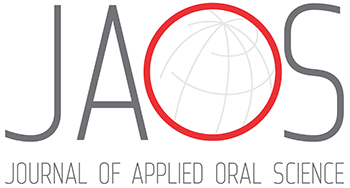Abstract
Titanium tetrafluoride (TiF4) is known for interacting with enamel reducing demineralization. However, no information is available about its potential antimicrobial effect.
Objectives
This study evaluated the antimicrobial and anti-caries potential of TiF4 varnish compared to NaF varnish, chlorhexidine gel (positive control), placebo varnish and untreated (negative controls) using a dental microcosm biofilm model.
Material and Methods
A microcosm biofilm was produced on bovine enamel previously treated with the varnishes, using inoculum from human saliva mixed with McBain saliva, under 0.2% sucrose exposure, for 14 days. All experiments were performed in biological triplicate (n=4/group in each experiment). Factors evaluated were: bacterial viability (% dead and live bacteria); CFU counting (log10 CFU/mL); and enamel demineralization (transverse microradiography – TMR). Data were analysed using ANOVA/Tukey's test or Kruskal-Wallis/Dunn's test (p<0.05).
Results
Only chlorhexidine significantly increased the number of dead bacteria (68.8±13.1% dead bacteria) compared to untreated control (48.9±16.1% dead bacteria). No treatment reduced the CFU counting (total microorganism and total streptococci) compared to the negative controls. Only TiF4 was able to reduce enamel demineralization (ΔZ 1110.7±803.2 vol% μm) compared to both negative controls (untreated: ΔZ 4455.3±1176.4 vol% μm).
Conclusions
TiF4 varnish has no relevant antimicrobial effect. Nevertheless, TiF4 varnish was effective in reducing enamel demineralization under this model.
Keywords
Dental biofilm; Enamel caries; Fluoride; Titanium; Varnish



